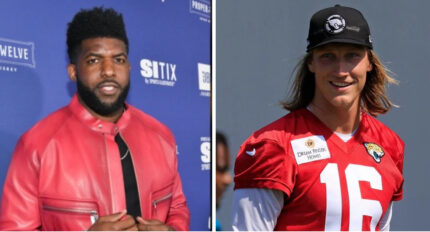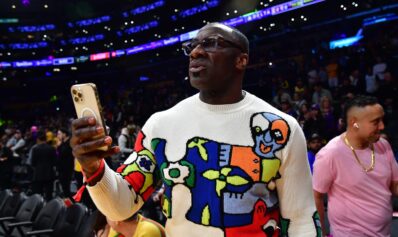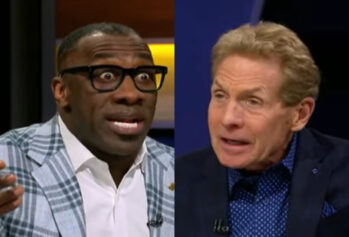Marcellus Wiley has defied the odds and made a successful career for himself as a man who came from an environment where many oftentimes falter.
Raised in Compton, Wiley attended the prestigious Ivy League school Columbia University, where he played football for the Lions. Starting his career as a running back, Wiley grew into a defensive end and was eventually drafted by the Bills in 1997. He would go on to play for Buffalo, the Chargers, Dallas and Jacksonville, making the Pro Bowl in 2001 while with San Diego.
After his pro career was over, he became a successful media personality with ESPN and then recently shifted over to Fox Sports, now appearing most frequently with Jason Whitlock on FS1’s “Speak For Yourself”. Yesterday, Wiley took a discussion about Jay-Z, the NFL, and Colin Kaepernick and turned it into one about Black identity politics.
While many in the Black community joke about colorism and the stereotypes that follow, Wiley seemed to forget about what defines someone as Black, dismissing light-skinned individuals from having the ability to experience dark-skinned Black problems.
“Kaepernick comes from a situation where he’s never felt the full weight of these injustices. This is a mixed-race guy who was raised by a white family from Wisconsin to Central California. Respect. That does not disqualify you from talking for us. But when you make missteps and miscalculations, oh, it comes back into play.
“And he never spoke on this when Black Lives Matter movement was at its height.”
Wiley continued on, dragging Kap’s girlfriend, Nessa, into the discussion.
“But Nessa comes into play now, and we all know Nessa. Respect to her and her ethnicity, but it’s not Black. So now we got two leaders who don’t even feel the weight of the consequences. So guess what you’re allowed to do right now- have convenience.”
Whoa.
Some might say Wiley is keeping it “100”, but he’s really exploiting the damaging game of Black identity politics, pitting light-skinned against dark-skinned and qualifying those who can and can’t experience the oppression and racism that Black people as a whole experience.
https://twitter.com/RobertKlemko/status/1163814648748994560
Do darker-skinned Black people face different stereotypes and reactions than lighter-skinned Black people? Yes. The commentary and perceptions are different. The jokes and the immediate reactions are different, all because of the shade of the skin.
But that doesn’t mean that racism affects those with lighter skin any less, for not only do they face questions of their Blackness from white people, they also have to, in some ways, justify their Blackness to Black people.
And to state that they don’t feel the weight of the consequences, and insinuate that they acquire a “pass” because their skin tone is lighter is disrespectful, damaging, dismissive and dangerous.
Defining Blackness
Marcellus’ commentary essentially dismissed the impact and significance of powerful leaders from history who fought to help Black people regardless of the shade of their skin. Malcolm X, Bob Marley, Huey Newton, Adam Clayton Powell, Angela Davis, Barack Obama, and so many others. All lighter-skinned (mixed race as Wiley says) Black men and women who fought for Black people, yet who also had to constantly fight both people within, and outside of, their race, many times simply because detractors felt they were the “wrong type of Black.”
Wiley’s segment opened up a Black Pandora’s box and cannonballed right into the issue of what defines Blackness. Is it skin color? Is it ancestry? Is it an attitude, expression or the way a person identifies themselves? Is it the “one drop” rule?
Wiley’s physical appearance will always be the first thing he’s judged on when he enters a room. His athletic build will overshadow the fact that he graduated with a sociology degree from Columbia, which will also always subject him to the shocking “you went to Columbia?” question.
It’s unfair, but it comes with the territory.
Does he have the right to be sensitive about the racism and stereotyping he’s had to experience?
Absolutely, and no one has the right to dismiss those feelings.
But his statements yesterday took those emotions and targeted them directly at other Black people. They were inclusive of the “he’s not one of those Black people” comments white people love to shoot themselves in the foot with, and it invoked a highly emotional discussion that’s always plagued the Black community, oftentimes causing lines to be drawn and progress to be halted.
We could take a deep dive into the sociological and psychological aspects of Wiley’s comments and feelings, but you can read a textbook for that. And I’m not even touching the fact that Nessa’s family is from Egypt or the association between Black Americans and “the Motherland.”
What is important to note is that Wiley, in his support of Jay-Z, wrongfully exploited one of the superficial factors that divide Black culture
Skin tone.
Hypocrisy Of Black Identity Politics
Wiley went at Kap, calling him out for allegedly not supporting the Black Lives Matter movement and then criticizing him for only becoming “woke” after Nessa came into the picture.
So education leading to enlightenment is not allowed now? Having an intelligent woman help you understand what’s transpiring in society is now a verbally punishable offense? Obtaining a sense of self and purpose should result in one being ostracized?
He should be applauding both Kap and Nessa for their actions and contributions to each other and the community, not taking digs at them on national TV. He should have also read Kap’s story in Paper Magazine before he went on air, as he would have learned what inspired Kap to become an activist.
Light vs dark has remained a constant battle, and it’s not just in the comic books. It’s a subtle, yet very real, tension constantly simmering in the Black community, and Marcellus put it front and center on TV yesterday in a way that detracts from the efforts made by those whose skin tones are what they are, simply because they were born that way.
Kap was raised by a white family which loves him and supports him. Why hold that against him? He’s not a male Rachel Dolezal. He’s a Black man who happens to have been raised by a white family. Through that rationale, does that invalidate Michael Oher if he chooses to continue what Kap started?
“You know why the identity of this movement has been lost? Because the identity of those who are leading it has always been in question.” stated Wiley, who also stated that he hated playing the race card against his own race.
This seems to be a hypocritical commentary by Marcellus, who says “respect” to Kap, Nessa, Eric Reid and Kenny Still with one hand, but slashes their character with the other.
Wiley can support Jay-Z for taking the baton from what Kap started and turning it into his partnership with the NFL; no problem.
But don’t wrongfully employ Black identity politics to hate on Kap. His physical attributes, and doing what no one else would do, should not be victimized or slandered, especially by someone who has suffered through similar treatment due to similar attributes.



